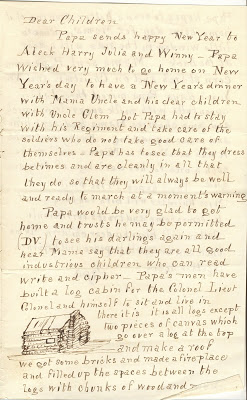This is the initial post in a series of articles that will explore the Rosenbach’s newest initiative, Families Affected by Wartime. This ground-breaking initiative will serve the military community, a population largely ignored by museums. The Rosenbach houses an exceptional collection of wartime letters and documents which speak to the personal experience of war and the challenges faced by service men and women and their families. The project aims to connect families from the past with those from the present, demonstrating the relevance of historical documents to our contemporary wartime experience.
Over the next few months, project advisers as well as Rosenbach staff and trustees, will be sharing their experiences with the Families Affected by War project here on the Rosenblog. Contributors will include Lovella Calica, the Founding Director of Warrior Writers, Stephanie Himel-Nelson, the Director of Communications at Blue Star Families, James Martin, a retired US Army Colonel and a professor at the Graduate School of Social Work and Social Research at Bryn Mawr College and Joyce Raezer, the Executive Director of the National Military Family Association.
Derick Dreher, John C. Haas Director, Rosenbach Museum & Library **************
I’ve always had the utmost respect for those that joined the military in response to 9/11 and the families they left behind. But, I’ve often felt frustrated by the fact that I can’t actually do anything to show my support and respect. That changed the day that the Rosenbach became a Blue Star Museum. The initiative, organized by the military family support organization Blue Star Families, invites service men and women and their families to visit museums free of charge during the summer months. This program, based on a very simple idea, has been Blue Star Families’ most successful initiative to date and yet it stops tantalizingly short of providing the type of experience the Rosenbach aims to provide for its visitors. The Rosenbach is committed to engaging visitors in its collections, in part by encouraging them to share their own knowledge and experience. We encourage our visitors to talk back. So, how can we engage military families with our collections and encourage them to talk back? I wanted to find that conversational catalyst.
It turns out that I have a lot from which to choose. One of the most poignant examples in the museum’s collection is a Civil War era letter written by a father to his children in which he attempts to describe his wartime responsibilities.
“Papa wished very much to go home on New Year’s day to have a New Year’s dinner with Mama, Uncle and his dear children with Uncle Clem but Papa had to stay with his Regiment and take care of the soldiers who do not take good care of themselves.”
I was struck by how contemporary this letter sounds; it could have been written by a parent stationed in Iraq in 2011. Encouraged by this discovery, the Families Affected by Wartime project began to take shape.
In May of this year, the Rosenbach was awarded a grant from the Pew Center for Arts and Heritage through the Heritage Philadelphia Program to support the initiative. During the spring and summer, we reached out to individuals familiar with the needs of the military community to help guide our thinking. These advisers include representatives from military family support organizations, staff from Philadelphia’s VA Medical Center and the Pennsylvania National Guard. The advisers provided us with valuable information about the needs of the military community. They stressed that while organizations like the Veteran’s Administration and Blue Star Families provide support, there are still many members of the military community that feel a lack of support and experience isolation from their community.
An article written by the director of the Iraq/Afghanistan Deployment Impact Fund noted that “Warriors don’t come home to federal agencies. They come home to communities and families, and that’s where we can make a difference.” Our advisers agreed that this is true; organizations such as the Rosenbach can have a role to play in providing support for members of the military community. And we’ve come to realize that our quest to support military families is not an unrealistic endeavor, far from it. The issue of supporting the troops and their families can seem mired in conflict and debate. But, we don’t have to wait until government debates are resolved before taking action at the community level.
Emilie Parker, Hirsig Family Director of Education, Rosenbach Museum & Library

